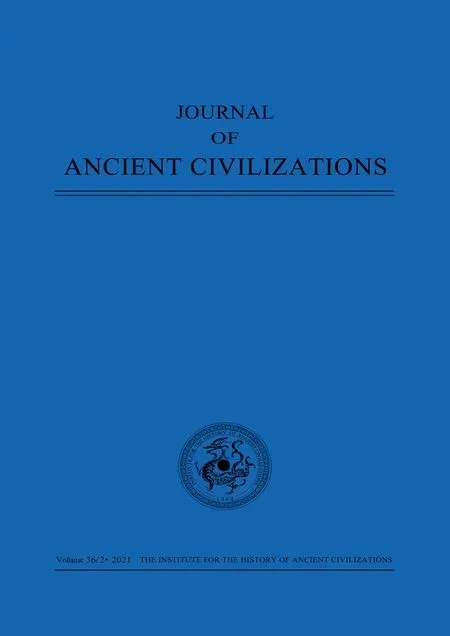Editors’ Note
TheJOURNAL OF ANCIENT CIVILIZATIONS(JAC) is published annually in two fascicles by the Institute for the History of Ancient Civilizations (IHAC,Northeast Normal University, Changchun, Jilin Province, People’s Republic of China).
The aim ofJACis to provide a forum for the discussion of various aspects of the cultural and historical processes in the Ancient Near Eastern and Mediterranean world, encompassing studies of individual civilizations as well as common elements, contacts, and interactions among them (e.g., in such traditional fields as Assyriology, Egyptology, Hittitology, Classics, Byzantine Studies, and Sinology, among others). Hence, we publish the work of international scholars while also providing a showcase for the finest Chinese scholarship, and so welcome articles dealing with history, philology, art, archaeology, and linguistics that are intended to illuminate the material culture and society of the Ancient Near East, the Mediterranean region, and ancient China. Articles discussing other cultures will be considered for publication only if they are clearly relevant to the ancient Mediterranean world, the Near East, and China. Information about new discoveries and current scholarly events is also welcome. Publishers are encouraged to send review copies of books in the relevant fields.
JACis a double-blind peer-reviewed journal. Articles must not have been published in, or submitted to, another publication at the time of submission. All submitted articles are first carefully read by at least two editors ofJAC, who will give a feedback to the author. Articles (excluding book reviews or research reports) are afterwards reviewed anonymously by at least two referees in the specific field, appointed by the editorial board. The whole peer-review process as well as any judgment is based on the quality of the article and the research conducted therein only. In cases where the reviewers recommend changes in the manuscript, authors are requested to revise their articles. The final approval of articles is at the editorial board. Throughout the whole peer-review process,articles are treated confidentially. In case of (alleged or supposed) interest conflict, misconduct, or plagiarism of any party involved the editor in chief and/or the executive editor in chief (or, if necessary, another member of the editorial board) will pursue the case and should the situation of taking action arise, will notify the respective party. From time to time, we will publish a list of the referees on our homepage (http://ihac.nenu.edu.cn/JAC.htm), to make the double-blind peer-review process transparent and comprehensible.
With this fascicle, we celebrate IHAC and our current director, Professor Zhang Qiang. From 16 to 17 January 2020, the international conference: “Ad Fontes Ipsos Properandum! Law, Economy, and Society in Ancient Sources”was held at our institute, in times when conferences with physical presence were still possible (conference report: Sven Günther & Zhengyu Wang in H-Soz-Kult 25.02.2020, https://www.hsozkult.de/conferencereport/id/tagungsberichte-8655).The participating scholars came from China and around the world, to celebrate IHAC’s 35th and its director’s 60th birthday. Five selected and double-blind peer-reviewed papers are published here, all mirroring current developments in ancient studies and especially so-called auxiliary sciences of history, to promote discussion about the future perspective of IHAC’s hallmark, the historical analysis and interpretation of source material.
Guo Zilong examines the modes of republished texts in the Attic orators,particularly the adaptions due to changing socio-political circumstances. Irene Berti presents her current research on the production of writing materials based on Greek inscriptions from Delos. Elisabeth Günther focuses on how to read theatrical gestures in ancient images and texts by analyzing the different modes in comedy-related vase-paintings and contemporary literary texts. Péter Kató analyzes the socio-economic presence and benefactory behavior of wealthy Coans in the epigraphic evidence around 200 BC. Finally, Stefanie Schmidt discusses the trading of goods in Roman Syene, especially the role of custom dues and responsible officials in both, long-distance and inter-regional trade.
All communications, manuscripts, disks, and books for review should be sent to the Assistant Editor, Journal of Ancient Civilizations, Institute for the History of Ancient Civilizations, Northeast Normal University, 130024 Changchun,Jilin Province, People’s Republic of China (e-mail: jac@nenu.edu.cn), or to the Executive Editor in Chief, Prof. Dr. Sven Günther, M.A. (e-mail: svenguenther@nenu.edu.cnorsveneca@aol.com).
 Journal of Ancient Civilizations2021年2期
Journal of Ancient Civilizations2021年2期
- Journal of Ancient Civilizations的其它文章
- DELIAN ACCOUNTABILITY AND THE COST OF WRITING MATERIALS*
- PICTORIAL ELEMENTS VS. COMPOSITION? “READING” GESTURES IN COMEDY-RELATED VASE-PAINTINGS (4TH CENTURY BC)*
- WEALTHY KOANS AROUND 200 BC IN THE CONTEXT OF HELLENISTIC SOCIAL HISTORY
- REPUBLISHED TEXTS IN THE ATTIC ORATORS
- EARLY ROMAN SYENE (1ST TO 2ND CENTURY) –A GATE TO THE RED SEA?
